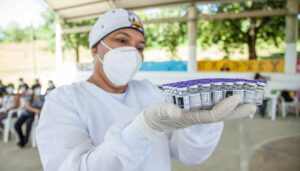
JACKSONVILLE, Florida – In a groundbreaking fusion of space exploration and medical science, Dr. Abba Zubair, a distinguished physician and researcher at the Mayo Clinic, is leveraging the unique conditions of space to drive advancements in treating diseases such as cancer, stroke, and bone loss. His pioneering research aboard the International Space Station (ISS) is revealing critical insights into human physiology that could benefit both astronauts and patients on Earth.
Dr. Zubair’s work is part of a broader effort to harness the microgravity environment of space for medical breakthroughs. Since 2017, he has launched three research projects to the ISS, with more planned, focusing on how the absence of gravity, radiation, and vacuum conditions affect biological processes. “The goal is to harness the uniqueness of the space environment for the betterment of humanity, be it on Earth or in space,” Dr. Zubair explains.
Exploring Stem Cells in Space
As a specialist in regenerative biotherapeutics, Dr. Zubair is particularly interested in mesenchymal stem cells, which are crucial for future stroke treatments. These cells are a cornerstone of regenerative medicine and are integral to Mayo Clinic’s bone marrow transplant program. One of his primary research objectives is to understand how microgravity influences stem cell division and growth rates.
“We wanted to see whether cells grown in space are any better or grow faster than cells grown in the lab,” Dr. Zubair notes. “Our first space flight yielded fascinating results, showing that the absence of gravity affects stem cells differently depending on the type.” This revelation has led to further investigations into how these cells contribute to bone formation and the prevention of osteoporosis, a condition that astronauts are particularly susceptible to despite rigorous exercise regimens.
Implications for Cancer Treatment
Dr. Zubair’s research extends to understanding how leukemia stem cells, the progenitors of blood cancer, react to the space environment. His studies aim to mitigate the effects of space radiation and prevent cancer, a concern for astronauts on long-term missions, such as journeys to Mars, where Earth’s protective magnetic field is absent.
The potential benefits on Earth are significant. “We are working to understand the impact of space radiation, from the angle of how we can mitigate the effect of radiation and prevent cancer,” Dr. Zubair says. His findings could inform strategies to protect cells during radiation exposure, such as in nuclear accidents, and enhance treatments like CAR-T therapy and bone marrow transplants.
“If we can understand how stem cells in space, especially hematopoietic stem cells, expand and differentiate to make immune cells like T cells, we will learn how to make them more efficiently,” Dr. Zubair emphasizes.
Future of Space-Based Medical Treatments
Looking ahead, Dr. Zubair envisions a future where space could play a direct role in medical treatments. He suggests that microgravity might enhance the effectiveness of chemotherapy by inducing cancer cells to enter the cell cycle, making them more susceptible to treatment.
“If that is the case, that absence of gravity can induce leukemia cells or other cancer cells to go into cell cycle, that makes them susceptible to chemotherapy,” he explains. “So instead of giving the chemo on Earth, you might go into space where the absence of gravity makes the cancer cells more vulnerable to chemotherapy. That is definitely something that I would love to explore.”
While creating a comparable microgravity environment on Earth presents challenges, Dr. Zubair remains optimistic about the technical possibilities. His work underscores the potential for space research to revolutionize medical treatments, offering hope for new therapies that could significantly improve patient outcomes.
The announcement comes as the intersection of space exploration and medical research gains increasing attention, highlighting the potential for space-based studies to yield transformative health benefits on Earth. As Dr. Zubair continues his pioneering work, the implications for both space travel and terrestrial medicine are profound, promising a new era of scientific discovery and innovation.







